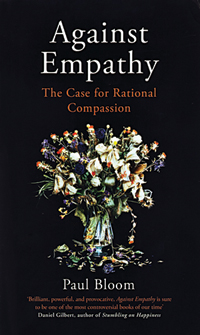Against Empathy
by Paul Bloom
Published by Bodley Head www.penguin.co.uk/vintage
Who would be against empathy? Murders, psychopaths, commuters on public transport who watch Youtube without earphones? Monsters all surely? In fact, argues author and psychologist Paul Bloom, empathy is at the root of a lot of violence and psychopaths are perfectly capable of empathising with victims (there’s no excuse for the earphonless Youtubeers though – they really are monsters).
Everybody from self-help gurus to presidents have told us we need more empathy, even that we’re facing an ‘empathy crisis’. Not so says Bloom. The problem isn’t that the world has too little empathy but rather that we have too much of it. Using empathy as a moral guide often does more harm than good because, as Bloom, sets out to convince us, empathy is inherently unfair, shortsighted, racist and innumerate.
But surely empathy makes people kind, it opens their hearts (and pockets) to help the suffering of the world? Again, no, argues Bloom. What all those pictures of hungry children and desperate refugees do is focus the kindness of people who are already kind. It’s a spotlight saying ‘look at this suffering, alleviate this pain’. The problem with spotlights is all the things they don’t illuminate. The media coverage of the 2012 Sandy Hook elementary school shooting where 20 student lost their lives saw so many toys and presents flooding the town that a warehouse had to be hired to store the useless gifts. The 300 school aged shooting victims (and 24 fatalities) in Chicago that year were largely ignored. Relying on empathy can backfire too – as the story of the woman living near a Concentration Camp illustrates. She wrote a strong letter asking that the appalling cruelty she saw every day be stopped… or at least moved to where she couldn’t see it.
To be fair, Bloom isn’t wholly against empathy. It has some limited uses and it’s a built-in feature after all. Toddlers and even rats will work to alleviate another’s suffering but empathy often stops at your tribe’s border (whether you define that as your species, your race or your sports team). You care more about your child’s grazed knee than the death of a thousand far-away strangers. A good attitude for a parent says Bloom but a very bad one for policy makers and a poor moral guide for the treatment of others.
If empathy is so bad how come nobody has noticed until now? Perhaps because the benefits so often attributed to empathy are confused with other morally good states – compassion, warmth, understanding. Buddhists out there may recognise some of Bloom’s arguments as they mirror the philosophies of ‘great compassion’ versus ‘sentimental compassion’ – feeling for rather than with. Bloom quotes studies showing that training in compassion rather than empathy generates feelings of kindness, a greater willingness to help and prevents burnout.
He wanders into the field of politics too. Differences between left and right boil down, not to a lack of empathy in one or the other camp, but rather a difference in focus as to whom we should be empathising with. Both have their own (mutually antithetical) sacred cows, both demand retribution for transgressions and the more empathic people are the harsher the punishments they mandate. Passion and zeal, he contends, are often associated with good while ‘cold’ reason is the preserve of evil. In real life, those two are often reversed
There are some quibbles. Bloom comes across as hypocritical in his early dismissal of neuroimaging technology since he leans on it heavily in later sections to support his position. He also has some (circa 2016) views on the basic sensibility of the body politic which sound hopelessly naïve today. These grumbles don’t affect his central premise though and while our biological and culturally predisposition to empathy makes the ‘head over heart’ argument a tough pitch, Bloom sells it well.
